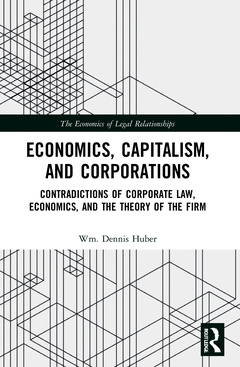Description
Economics, Capitalism, and Corporations
Contradictions of Corporate Law, Economics, and the Theory of the Firm
The Economics of Legal Relationships Series
Author: Huber Wm. Dennis
Language: English
Subjects for Economics, Capitalism, and Corporations:
Keywords
corporate law; theory of the firm; contract law; property law; agency law; trust law; corporate statutory law; publicly traded corporations; economics of capitalism; Accounting considerations; Ipo; Capitalism; Delaware general corporation law; Economic theory; FASB; FASB Conceptual Framework; Initial Public Offering; Double Entry Bookkeeping; Double Entry; Incomplete Contracts Theories; GAAP; Fiduciary Duty; Physical Capital; Residual Claims; Corporation’s Equity; Financial Capital; Weighted Average Cost; Uniform Commercial Code; Investment Considerations; Incomplete Contracts; Delaware Corporate Law; General Purpose Financial Reporting; Delaware Supreme Court
Publication date: 08-2022
Support: Print on demand
Publication date: 12-2020
· 15.6x23.4 cm · Hardback
Description
/li>Contents
/li>Readership
/li>Biography
/li>
This book is a continuation of Corporate Law and the Theory of the Firm: Reconstructing Corporations, Shareholders, Directors, Owners, and Investors. The author extends his analysis of contract law, property law, agency law, trust law, and corporate statutory law and applies that analysis to defy conventional concepts and theories in economics, finance, investment, and accounting and expose the artificial boundaries established by decades of research founded on indefensible assumptions and fallacious conclusions.
Using the Humpty Dumpty principle, where words mean what the authors want them to mean, economists have created "strange new worlds" where contract law, property law, agency law, and corporate statutory law no longer apply.
The author dismantles the theory of the ?rm by proving the theory of the firm wilfully and intentionally ignores fundamental contract law, property law, agency law, and corporate statutory law. Contrary to the theory of the firm, shareholders do not own corporations, directors are not agents of shareholders, and shareholders are not investors in corporations.
The author proves that by property law and corporate law, capital is not privately owned by capitalists but by corporations. Entire economic and social systems have been constructed that have no basis in law. With the advent of publicly traded corporations, the capital is there, but both capitalists and capitalism have been rendered extinct.
This book will appeal to researchers and graduate and upper-level undergraduate students in economics, ?nance, accounting, law, and sociology, as well as legal scholars, attorneys and accountants.
Prologue 1. Review of Corporations and Corporate Law, Contract Law, Property Law, Agency Law, and Trust Law Part I Corporations, Owners of Shares and Investors in Shares: Economic, Finance, Investment, and Accounting Considerations 2. Corporations and Economic Considerations 3. Corporations and Finance Considerations: Corporations, Owners of Shares, and Investors in Shares 4. Corporations and Investment Considerations: Corporations, Owners of Shares, and Investors in Shares 5. Corporations and Accounting Considerations: Corporations, Owners of Shares, and Investors in Shares PART II The Nature of the Firm and Theory of the Firm 6. The Nature of the Firm 7. The Theory of the Firm PART III Capital, Capitalism, and the Communist Manifesto 8. Capital 9. Capitalism 10. Marx: Capital, Capitalism, Capitalists, Corporations, and the Communist Manifesto Part IV The Contradictions of Economics and Corporate Law 11. Review of the Contradictions of Corporate Law 12. Contradictions of Corporate Law, Economics, Finance, Investment, Accounting, and the Theory of the Firm Epilogue
Wm. Dennis Huber received a DBA in international business, accounting, finance, and economics from the University of Sarasota, Florida; a JD, an MBA in accounting and finance, an MA in economics, an Ed.M., and an MS in public policy, and a BA in sociology and psychology from the State University of New York at Buffalo. He also has an LL.M. in homeland and national security law from the Western Michigan University Thomas M. Cooley School of Law. He is a certified public accountant and admitted to the New York Bar. He has taught at universities in the U.S., Canada, Mexico, and the Middle East.




